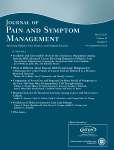
Preparing for the End of Life: Preferences of Patients, Families, Physicians, and Other Care Providers
Abstract
To examine patients', families', and health care providers' preferences regarding preparation for the end of life, attributes of preparation were generated in qualitative focus group discussions and subsequently tested for generalizability in a quantitative national survey. Respondents from all groups showed consensus on the importance of naming someone to make decisions, knowing what to expect about one's physical condition, having financial affairs in order, having treatment preferences in writing, and knowing that one's physician is comfortable talking about death and dying. Patients were more likely than physicians to want to plan funerals and know the timing of death and less likely than all other groups to want to discuss personal fears. Participants in care of dying patients agree overwhelmingly with the importance of preparation. However, significant barriers to preparation impede it from being a common part of clinical encounters. Further research and training are needed to ensure that the desire for greater preparation is translated into improved action toward preparation in medical practice.
Citation:
K.E. Steinhauser, N.A. Christakis, E.C. Clipp, M. McNeilly, S. Grambow, J. Parker, and J.A. Tulsky, "Preparing for the End of Life: Preferences of Patients, Families, Physicians, and Other Care Providers" Journal of Pain and Symptom Management, 22(3): 727-737 (September 2001)